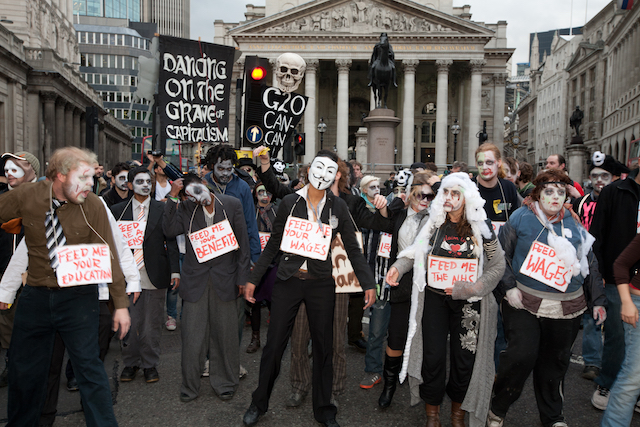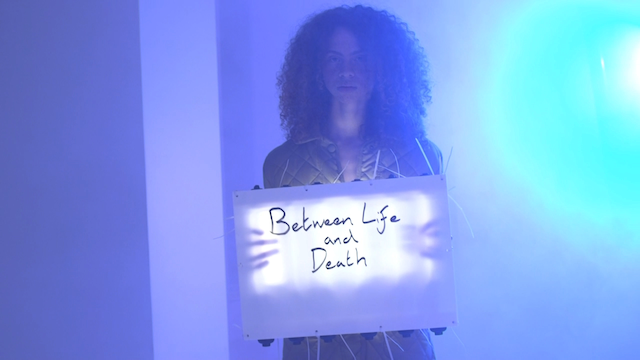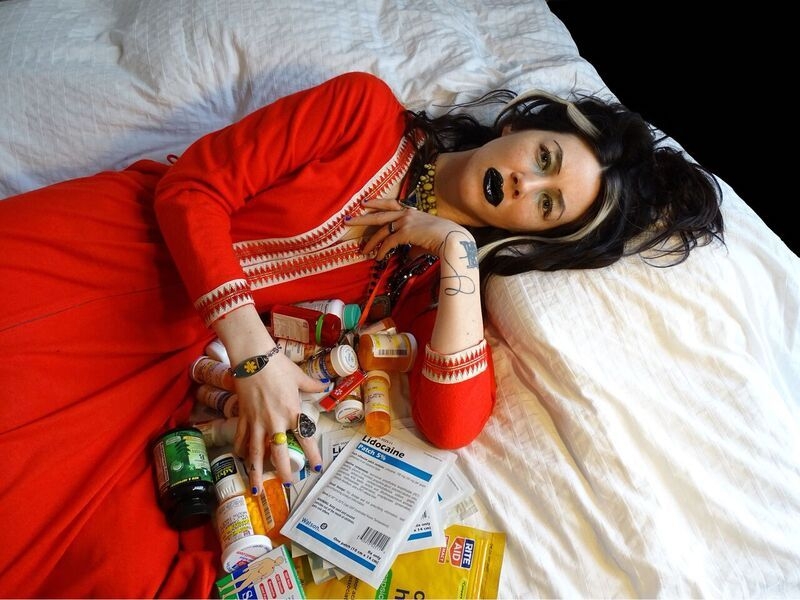In a capitalist society, fitness is nothing other than a measure of the extent to which you are capable of serving capital. According to a recent report by the UK’s Office for National Statistics, the average number of sickness absence days that UK workers took in 2017 has almost halved since records began in 1993. The report speculates that this is a result of improved healthy life expectancy, or, alternatively, because private-sector workers won’t be paid for ill-health related absences. Stuck then between improved overall health and ‘presenteeism’ – a phenomenon in which people struggle to work through sickness – contemporary understandings of health have found it hard to decide upon a diagnosis. Are we, as is suggested by those statistics, fitter than ever? Or, as many of today’s critics suggest, are we in fact sicker – mentally, existentially, physiologically? When the Socialist Patients’ Collective in the early 1970s declared that ‘to be healthy means to be expropriated and exploitable’, it is clear that the era of the total capture of the body by capital has long been upon us, and that illness today must be seen as a weapon against capitalism, insofar as it operates as a form of labour-sabotage. No longer can artists romantically exit the everyday or reach ‘the unknown’ via the ‘derangement of all the senses’ that Rimbaud described in 1871: illness, induced or accidental, is a spanner in the works, but cannot, any longer, be separated from the machine.
What happens when it is illness that wants to speak through us, when sickness becomes the voice itself? Can illness somehow speak out against the conditions that produce it?
The way we understand sickness today can itself be seen symptomatically, that is to say, as an indicator of deeper questions lying just beneath the battered dermis of life in general. We can ask: what is sickness, what makes us sick, and what kind of subjects are we when we identify with our sickness? Dominated by regimes of consumerism, private property and identity, it is not surprising that there is a current tendency for people to ‘own’ their illnesses, and to become coterminous with them as a central feature of their identity, and to create in-groups and out-groups on this basis: those who do not have an autism or an ADHD diagnosis, for example, are now described as ‘neurotypical’ or ‘allistic’, normative categories that mark out difference through comparison and separation.
Korean-American artist Johanna Hedva, author of the 2016 essay ‘Sick Woman Theory’ suggests that belonging to the illness club is a matter of an elective affinity: ‘You know who you are, even if you’ve not been attached to a diagnosis: one of the aims of Sick Woman Theory is to resist the notion that one needs to be legitimated by an institution, so that they can try to fix you.’ Contemporary sickness thus becomes a pathological attachment, backed up by a theory of domination. Hedva continues:
‘The Sick Woman is an identity and body that can belong to anyone denied the privileged existence – or the cruelly optimistic promise of such an existence – of the white, straight, healthy, neurotypical, upper and middle-class, cis- and able-bodied man who makes his home in a wealthy country, has never not had health insurance, and whose importance to society is everywhere recognized and made explicit by that society; whose importance and care dominates that society, at the expense of everyone else.’
We see the flip-side to Hedva’s coin in contemporary art’s handwringing admission of guilt on all these fronts. In a recent interview, Ed Atkins sums up this reflective misery, at once generative and impotent:
‘I am a man and I am white and middle-class and Western. The category that need not be named. I am privilege. But I also want to be able to speak, I suppose. But being all these categories, I want to speak negatively – to undo speech as well. A gesture that sucks it back – though of course that’s impossible. I don’t want to speak for anyone else. My work should have as much emotional autobiographical feeling as I can put into it without being explicitly about me in any way.’
Atkins’ simultaneous embrace and disavowal of identity reopens an older, literary question, from Beckett by way of Foucault: ‘what does it matter who is speaking, someone said, what does it matter who is speaking?’ Only today, it appears to very much matter ‘who’ is speaking, hence the double bind Atkins finds himself in. But he nevertheless wants to speak. Is this too a kind of sickness, a kind of compulsion? What happens when it is illness that wants to speak through us, when sickness becomes the voice itself? Can illness somehow speak out against the conditions that produce it? Capitalism – or a certain image thereof – is, in many contemporary analyses, frequently positioned as the rotten root at the base of a whole range of contemporary ills, from obesity, diabetes, cancer to anxiety, depression, stress, developmental disorders and general malaise. These ailments, reputedly caused by today’s equivalent to William Blake’s ‘dark Satanic mills’ – now our ‘whitish mildly-demonic personal computers’, perhaps – are to be laid like burnt offerings at the feet of a reified, monstrous, ineradicable beast: Capital. All days become sick days under the chthonic demiurge of capitalism. It is perhaps in the work of the late Mark Fisher that the argument that mental illness is an intentional form of class war reaches its zenith:
‘We must understand the fatalistic submission of the UK’s population to austerity as the consequence of a deliberately cultivated depression… Collective depression is the result of the ruling class project of resubordination. For some time now, we have increasingly accepted the idea that we are not the kind of people who can act.’
Fisher advises ‘converting privatised disaffection into politicised anger’, restoring the category of action to the subjects sickened to death (actually so in some cases) by austerity. We must admit, though, that this is an extraordinarily difficult project, seeing as its starting point is the acceptance of a direct if generic causal relation between capitalism and sickness. Is this assumption not itself potentially politically incapacitating? Is there no differentiated individual residual resistance to collective depression, and do our individual illnesses, addictions and mental health problems not play out in different ways? And might our response to these differences then inform a strong collective response to exploitation? When it comes to sickness, we do not know where to place the subject, individual or communal.

The recent rise to prominence of Canadian psychologist Jordan B. Peterson and his 12 Rules for Life: An Antidote to Chaos (2018) has led to derision and suspicion from those who see him as an apologist for the resurgent far right. At base, however, Peterson’s bestselling book presents a series of simple rules for improving one’s lot: ‘Stand up straight with your shoulders back’, ‘Treat yourself like someone you are responsible for helping’ and ‘Tell the truth – or, at least, don’t lie’. ‘We must have something to set against the suffering that is intrinsic to Being’ he writes. This strange and syncretic fusion of evolutionary theory, Christianity, Jung, Schopenhauer and 1950s patrician ideas of self-responsibility, proves to be highly irresistible to people tired (sick, perhaps) of sitting in bedrooms looking for someone else to blame. Glancing at the ‘Manosphere’ reveals a heavy interest in self-improvement, an end to ‘whining’, and the consumption of vast quantities of meat. Fitness guru P. D. Mangan (‘I teach how to eat right, get strong, live long, and win, with science-based health and fitness’) posts motivational tweets about diet that also function as pithy critiques of consumer capitalism and mental health:
‘You: “Doc, I’m depressed.”
Also you: eats junk food drinks soda, plays video games, 30 pounds overweight, sleeps 6 hours a night, works under fluorescent lights in a cubicle.
Doc: “Here, have some of these pills.”’
The tough talk that invokes a sense of personal responsibility for one’s health, and, by extension, one’s way of being in the world with others reveals, by its absence, a passive acceptance on the political left of a certain kind of collective defeated misery. Any suggestion that self-improvement or personal responsibility for mental or physical ill-health is a positive step is liable to be met with accusations of ‘gatekeeping’, ‘ableism’, ‘fatphobia’ or ‘body-fascism’. Though capitalism is to ‘blame’ for our sicknesses, there seems to be little exit from capitalist ‘solutions’ (in the form of over-mediation, and the over-consumption of harmful foods and substances), despite repeated identification by the left of capitalism as the apparent source of the sickness.
There are thinkers, such as Franco ‘Bifo’ Berardi in his 2017 essay ‘After the European Union’, who attempt to tie poor mental-health and legal and illegal drug use to a political situation
But all is not fair in love and war, in sickness and in health. Beyond medication, there are contemporary ‘cures’ in the form of the various ‘self-care’ industries, where diet, cleaning and sleep all somehow become ‘lifestyle choices’, as opposed to basic techniques of sustenance and hygiene. Here we see the feminised counterpart to the Manosphere’s emphasis on meat and muscle – the bubble-bathification of the female, the retreat into comfort and candles accompanied by the fantasy that this is some kind of radical gesture. As Anne Dufourmantelle, who died in 2017 trying to save two children from drowning, puts it in Power of Gentleness: Meditations on the Risk of Living: ‘Theories of self-improvement and pursuit of happiness participate in spite of themselves in this grand marketplace of “well-being” that refuses to enter into negativity and confusion and fear as essential human elements, paralyzing the future as well as the present.’ The good neoliberal subject is subject to his or her apps and avoids risk and excess at all costs: the heart is an organ whose valves must be kept free of love as much as of fat. We are very far, today, from Foucault’s resurrection of Greek practices and techniques in his late work on ‘the care of the self’, and even further from any form of collective mass-mobilisation towards health that would directly take as its target both imposed sicknesses and their useless and expensive cures. Misery loves (drug) companies.
There are thinkers, such as Franco ‘Bifo’ Berardi in his 2017 essay ‘After the European Union’, who attempt to tie poor mental-health and legal and illegal drug use to a political situation that explains Trump’s appeal:
‘The parts of society where Trump triumphed in the USA are the same ones where psychic misery is most devastating. The depression epidemic and the deluge of opioids, heroin consumption increasing fivefold in a decade, the spike in suicides: such is the material condition of the so-called American middle class, the workers squeezed like lemons, and the unemployed devastated by their powerlessness.’

The undead artworld is a zombie juggernaut transporting various sicknesses from gallery to gallery, reinforcing identities here, positions there, and structures everywhere
Self-medication as a form of self-care in a devastated world becomes pure self-destruction, and there is little to differentiate political acts from pharmacological ones. If, as Kierkegaard wrote in The Sickness Unto Death (1849), ‘the torment of despair is precisely this inability to die’, that is to say, our sickness is existential, rather than merely a biological or historical fact, we must wonder what ‘death’ means today, in an era of technological life-extension for some, and mere perishing for others. Jarman prize-winner Oreet Ashery’s 12-part web-series and feature-length film Revisiting Genesis (2016) offers an unusually nuanced take on death, dying and disease, in an art context that has an often rather impoverished relation to such questions (let’s not speak of Damien Hirst’s long-term pharmacophilia). Here, Ashery mingles fictional dialogues with real interviews with those with life-limiting conditions, subjects who ruminate on questions of digital existence: what might our digital legacy be? How can we reconcile the viscerally embodied aspects of illness and dying with the clean bureaucracy of a networked culture? Regarding the context of Revisiting Genesis, Ashery said in a 2017 interview with the Guardian that ‘there is a sense that partial withdrawal can be a response to artistic overproduction and the culture that drives us so hard. Artists can never stop. You always have to self-present. You are always “on”. If you are not, it is as though you are dead.’
The undead artworld might be thought of as a zombie juggernaut transporting various sicknesses from gallery to gallery, reinforcing identities here, positions there, and structures everywhere. In that sense, then, it does no more than reflect back the confused state of sickness and health in our thinking (and living) more generally. But what would a collective, artistic attitude to sickness and health that tackled exploitation head-on, and avoided neoliberal ‘solutions’ as much as it did lethal drug epidemics, look like? We can start by imagining a position that avoids reduction to either mere identity or pure will, that neither pins us to structure nor isolates us as individuals fighting to survive in a hostile universe. We might not ultimately be able to avoid illness, at least not forever, but we do not have to exactly coincide with it: in this sense, then, contemporary art can potentially serve as a diagnostic of both the causes and the cure – to depersonalise illness without rendering it purely abstract, and to identify malign forces and causes without falling entirely prey to them.
From the September 2018 issue of ArtReview
